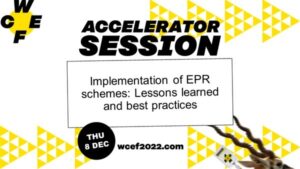Implementation of EPR Schemes: Lessons Learned and Best Practices (WCEF2022 Accelerator Session)- 8 December – Hybrid
Implementation of EPR Schemes: Lessons Learned and Best Practices
8 December, 10:00-12:00 CAT (9:00-11:00 CET)
Kigali (Rwanda) and online
Please Register here

EPR is one of the necessary tools for financing the collection and recycling of electronics and a range of other waste products. However, its potential benefits depend on their proper implementation, otherwise they may not always be effective in delivering the best environmental sound management.
The aim of the session will be to share knowledge around practical aspects of EPR schemes and to discuss complementary measures/solutions that can be considered when working towards functioning EPR schemes. This can include a shift to new business models, the use of supporting policies or the extension of producer responsibility beyond national borders. The session will also debate about an inclusive model of EPR where the informal sector is properly recognised and engaged. This session will dive deep into the economic tools such as EPR but also other complimentary policy measures to increase resource efficiency of electronics along its entire value chain.
Agenda
Welcome Remarks: André Weidenhaupt, Director General, Department of the Environment, Ministry of the Environment, Climate and Sustainable Development, Luxembourg
The use of EPR globally and some lessons from recent work at the OECD (10 minutes)
Video (GGGI Waste to Resources project) (5 minutes)
Setting up EPR Schemes (Piotr Barczak, Inclusive Circular Economy Expert, EEB), roadmap for developing countries (10 minutes, in-person)
CTL/PREVENT Waste Alliance/GIZ: Expanding current approaches that have been tried in 3 specific countries (10 minutes each)
-
- Kenya’s EPR Scheme – (Simone Andersson, Chief Commercial Officer, Waste Electrical and Electronic Equipment (WEEE) Centre)
- Private Sector Perspective – PPP and Government Collaboration in Rwanda – (Olivier Mbera, Country General Manager, Enviroserve Rwanda)
- Designing Tailor-made Integrated Resource and Waste Management programmes (Susanne Karcher founding member of the African Circular Economy Network)
- Complementary business model to EPR in Nigeria (Reinhardt Smit, co-founder Closing the Loop)
Debate on most effective EPR tools, sectors to be covered, criteria for modulation of fees, inclusion of informal sector (EEB+GGGI + all the participants) (30 minutes)
Networking Social Event
This event is an Accelerator Session at the World Circular Economy Forum 2022 (www.WCEF2022.com)

